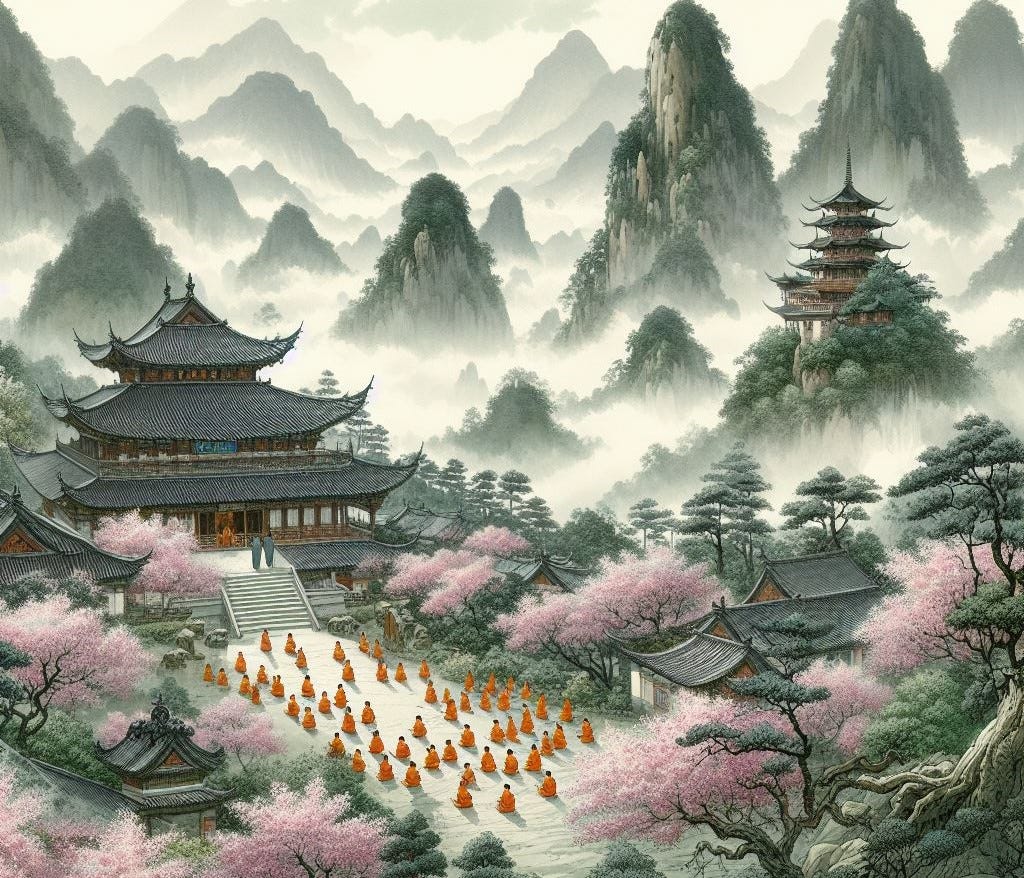
The Zen Master You May Have Never Heard Of
Have you ever met someone whose presence seemed to speak louder than words? That’s how I feel about Bodhidharma. He’s not just a historical figure or a teacher; he’s a living energy, a force of enlightenment that touches the soul without saying a word.
In this blog post, I want to introduce you to Bodhidharma, the Zen master whose impact continues to inspire generations. He’s not just the greatest Buddhist Zen master; he’s a timeless guide whose teachings resonate deeply with anyone open to their message.
Let’s take a journey back fourteen centuries to India, where Bodhidharma was born into royalty, the third son of a king in the Pallava empire down in the south. Despite his privileged upbringing, Bodhidharma wasn’t content with the usual royal affairs. He was incredibly smart and had this burning desire to understand himself deeply. So, he decided to leave behind his princely life and seek something greater. However, at a young age, he embraced Buddhism and sought instruction in the Dharma from Prajnatara, a revered teacher invited from the ancient Buddhist heartland of Magadha by his father.
Navigating the waters along the Indian coast and skirting the Malay Peninsula, Bodhidharma spent three years at sea before finally arriving in Southern China around 475. This arduous journey marked the beginning of Bodhidharma’s significant impact on Chinese Buddhism, as he brought with him not only the teachings of the Dharma but also a profound spiritual presence that would resonate for centuries to come.
Around the same time, Buddhism had already found its way to China, about two thousand years ago. Monks from India and Central Asia had been traveling there for years, spreading the teachings of Buddha. But when Bodhidharma arrived in China, something changed. His impact was unlike any other. His way of teaching and his profound insights struck a chord with the Chinese people like never before. And thus began a new chapter in the history of Buddhism, thanks to this extraordinary man from India.
Teachings
BUDDHAS DON’T SAVE BUDDHAS.
It’s a bit mind-bending, but let me break it down for you. Basically, he meant that we’re always searching for someone to give us all the answers, like spiritual gurus. But the truth is, we’re all Buddhas deep down. Some of us realize it, and some don’t — that’s the only difference. So, no one else can save us because we’ve got to do that ourselves.
Now, you might be wondering, “How do I find the Buddha within me? ” Well, here’s the thing: asking that question is a bit tricky because it’s the ego mind getting in the way. To truly see the Buddha within, you’ve got to quiet that chatty mind and just be in the moment — what Bodhidharma calls “no-mind.” Buddhas don’t follow strict rules or methods; they’re just fully aware and present. You’ve got to be your own guiding light, not relying on scriptures or rules to show you the way. Act from that pure awareness, and whether your actions are labeled good or bad won’t matter because they’ll come from a place of deep understanding and clarity.
EVEN IF THE TEACHER CAN RECITE THE TWELVEFOLD CANON, HE
CAN’T ESCAPE THE WHEEL OF BIRTH AND DEATH. HE SUFFERS IN THE
THREE REALMS WITHOUT HOPE OF RELEASE.
Having a lot of knowledge might make you sound smart, but it won’t necessarily give you that deep feeling of knowing your own eternal nature or your connection to everything. It’s like your mind gets filled with words, but inside, you still feel empty. Real truth, according to Bodhidharma, can only be experienced firsthand. Once it becomes secondhand, it loses its power and becomes just empty words.
Even if you’re super knowledgeable, like a scholar or a wise person, that doesn’t guarantee you’ll break free from the cycle of birth and death, or the suffering that comes with it, as per Gautama Buddha’s teachings. In Buddhism, even heaven isn’t seen as the ultimate goal because it’s still a form of suffering — just a more subtle kind. True freedom, or nirvana, means being liberated from all forms of suffering — whether it’s in heaven, on earth, or in hell. That’s when you reach true enlightenment.
If Bodhidharma’s teachings have piqued your curiosity, I’m eager to delve deeper into them in future blogs. Feel free to share your opinions